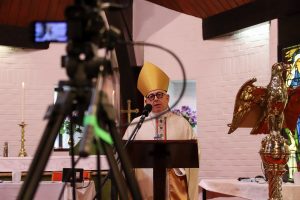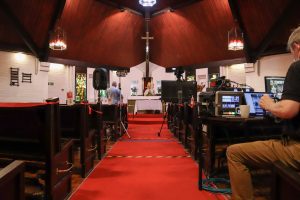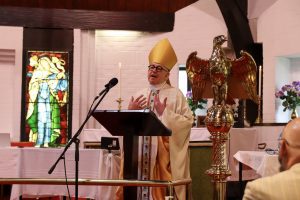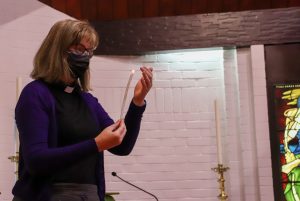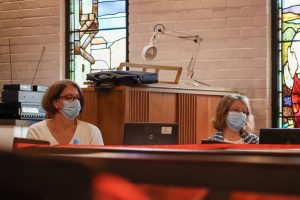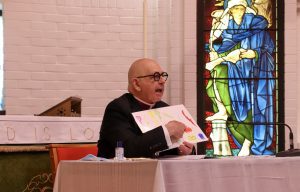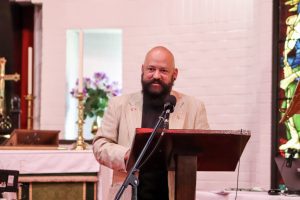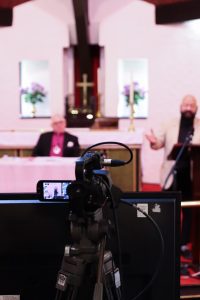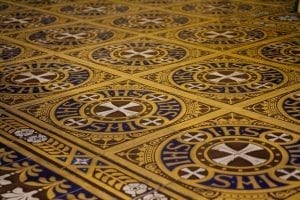On 31 July 2021, our Diocesan Synod took place via Zoom, with a central hub based in St James the Less Episcopal Church, Bishopbriggs.
Below is a selection of the relevant materials which were discussed and offered during Synod.
- The Bishop’s Charge
- The New Constitution
- Introduction and Presentation on the Constitution
- Canon Missioner’s Presentation on Transitional Ministry
- Dean’s General Synod Report and Climate Crisis Idea
- New Diocesan Centre Photos and Update from the Dean
- Photos from Synod
The Bishop’s Charge
In the name of the Father and of the Son and of the Holy Spirit…
From the book of Leviticus chapter 25 verse 13: “In the year of Jubilee you shall return unto your patrimony.” The Hebrew concept of Jubilee has much to teach us about God; the concept of Jubilee has much to teach us about Mission; the concept of Jubilee has much to teach us about discipleship. God, Mission. Discipleship: the concept of Jubilee has much to teach us about God who is love and God’s concern for the wellbeing of his people – as individuals, as a community of faith, and as a society. In other words, God’s world view.
In the year of Jubilee, in biblical terms, debts were cancelled, slaves were given their freedom and land returned to its original owners and laid fallow for the year, a year of Jubilee celebration. The Jubilee calculation was based on God’s Sabbath day of rest on the 7th day so seven years times seven; and in the 50th year is the year of Jubilee.
As a curate at ten past seven on a Tuesday morning in November, reading this to the faithful who joined the parish priest and myself: reading this, it was so exciting, as I always wanted to ask, “Now, who can tell me what seven sevens are?” just to see if they were awake! And that was before I promised them: “come every day for the next fortnight, and soon we will be on to the food regulations!” How exciting is that for the anal retentive?
Jubilee is a sign of God’s love and faithfulness to and for his people who are made in his image: the need to meet and celebrate. In this past year we have heard much about individual wellbeing, the need for Sabbath rest. For clergy, Christian leaders, members of our faith communities, wellbeing is a big issue as the faithful pastors seek to ensure the wellbeing of their people, spiritually, mentally and physically; as communities, as a society, our reaction to the pandemic has been illuminating. Why should we need food banks in one of the wealthiest societies in the world? It should be anathema to us, as should the rampant nationalism of hoarding vaccines, refusing to share resources, as should drug-related deaths in our own society.
Where is God, who is love? There, present as he has been present all year in small acts of kindness, generosity, caring: the phone call that has brought someone relief from loneliness: caring that has characterised the past year. God is with us, faithful to us as he was faithful to his people in the wilderness; and who among us has not wandered through the inner wilderness, doubt, confusion and at times despair in this past year? Wandered through that wilderness searching for an oasis of meaning and purpose, a Jubilee of celebration, of understanding and acceptance.
Obviously, this next year is a year of Jubilee for the Queen, our most gracious sovereign lady. And I’m not passing any particular comment on monarchy, just noting the fact that this particular year of Jubilee allows us to reflect on those facets of God’s love which are most evident when youth and novelty and glamour have faded, and wisdom, spirituality and faithfulness can be recognised for what they are: God’s own given means of entering more deeply into his own life.
And just think of the missional opportunities: people saying, “What is a Jubilee?” All you have to say is that it’s a biblical concept of celebration: use the word. In this year of Jubilee I will preach often on that facet of love which takes over when youth and novelty and glamour have faded: one word is duty, which I suggest is synonymous with faithfulness. Faithfulness.
And the best example of that synonym that comes to my own mind is Nelson Mandela. I’ve used this example often of Mandela’s release from prison on Robben Island because it remains to me – although it was in 1990 – it remains to me a very, very powerful image of what, in a sense, Loyola is all about. Mandela had been in prison for 20 years and he was released on a Sunday morning: my whole congregation piled into the Rectory to watch on the television, and the image of Mandela emerging from prison remains, for me, the most powerful example of the interior life, the interior life of genuine spirituality and growth. During the 1970s as an undergraduate I’d been on endless anti-apartheid marches; we had big pictures of a big burly African man. On that Sunday morning a rather diminutive figure emerged, a rather small grey-haired man but he was wholly and powerfully present and himself to a whole world he couldn’t possibly recognise: the banks of television cameras, the endless press photographers; powerfully and utterly he was himself.
For 20 years he had been faithful to God, and to his ideal; for 20 years he had done his duty and been faithful to himself: physical exercise, despite being confined and suffering poor food; regular Bible reading and prayer. Genuine spirituality wandering through the inner wilderness of doubt, confusion and what must have been at times utter despair, searching day by day, hour by hour for the oasis of meaning and purpose, the water of wisdom, growth. Remember, flowers do grow in the wilderness: unexpectedly, you can come across a bloom as we can come across hope, real hope that is the flower of our Lord’s life and death and resurrection.
Disciples of our Lord Jesus Christ live in constant expectation of the year of Jubilee, when property will be restored and slaves walk free. We live in hope and expectation, that hope and expectation which is eternal, and we live with the paradox that hope and expectation are now the reality of our lives through the love we share here and now.
Remember Mandela: all those years, many in solitary confinement, but the reality of love, of God, makes hope and expectation the reality of our lives.
Jesus lived, died and rose again to prove God is with us: that is the excitement of faith for me, that is what makes structure and process in this Diocesan Synod actually worthwhile. How do you, how does humankind, experience love that is of God? I would say it’s quite simple: it is the experience of being held. We are all aware of endless images of the Madonna and child: the child, baby, being held secure, warm, nourished, feeling wanted and cherished. And then think of the image of Mandela, and of the Madonna: how he felt held by ideal, by God and think again of the Madonna and those glorious words of Luke: “and the child Jesus grew in stature and in wisdom.”
Humankind longs for the security, warmth, nourishment of being held. Touch, human touch has been one of the casualties of this last year. But the disciple is held by God whom we seek, and yet paradoxically is with us: that is what Jesus is all about. To be held by God leads us deep, deep, deep within ourselves, that’s what Mandela, what Ignatius Loyola, great saints knew that. Intuitively, human kind longs to be held: the disciple recognises that need, and so in prayer, Bible reading, receiving the Sacrament of Holy Communion we are held by the security of love that is of God. That is the wisdom of the saints and many in our congregations have that wisdom, many of us and our congregations have longed to receive the sacrament, to hold the body of Christ as they feel held by the body of Christ, and that act of spiritual communion allows us to identify that ‘being held’ by the whole Communion of Saints and our own body of Christ, the Scottish Episcopal Church. That is the Sabbath rest, the year of Jubilee, a simple message that you are loved by God.
Mission. There is one strapline, that we could use as our simple message: You are loved by God. As all of you know, mission to me personally means an attitude of mind. The attitude of mind that every Sunday, every congregation, every member is prepared to welcome the visitor to worship.
The ‘Elijah principle’: it is so simple. Every Jewish family at the Passover sets a place at the table in case the prophet Elijah should join them that night. No matter in our congregations that you think you know exactly who will come Sunday by Sunday, always, always having set of books and a proper pew sheet, or whatever you give out, they must be ready in case Elijah, driven by the Holy Spirit, visits our congregation for a smile and a ‘Hello’.
The conversion experience is being made to feel welcome, wanted, special, and that has translated itself in this past year to those congregations who, when they opened up, designated people who were prepared to drop out should they have a visitor. And if Elijah should ask at coffee time, “Why do you come here?”, you could say “I come here because here I have an experience of God. I have an experience of the living God”. And be not afraid if the next question is “Could you possibly explain to me the doctrine of the Trinity?” Be not afraid, because the Holy Spirit may very well at that moment take over and speak through you.
Who knows how many times the Holy Spirit wishes to speak through us and we get in the way, don’t dare speak, can’t find the right words? So we walk away, we walk away in embarrassment. Strangers become disciples, or not, because someone smiles at them in church, someone asks them how they are. The Holy Spirit often suggests ask your friend, “Would you like to come with me on Sunday?” but you have to be convinced that there is something there on Sunday morning that is worthwhile. That’s wisdom.
I realise only too well how disappointing perhaps all that sounds. I said when I arrived in the Diocese that I was not coming with massive plans and programmes and maybe that is a disappointment to some. There has been a massive weight of expectation that I have experienced, but I will point out in the course of this Synod that Mission is the attitude of mind that decline is not inevitable, and the tools of Mission need to be properly recognised in and through, even especially, our own Diocesan Synod.
One of those tools is, I believe, the Diocesan Constitution. I am eager to introduce the new Constitution because it will enable the Diocese to fulfil its mission to make new disciples of our Lord Jesus Christ. It reflects the real life of our Diocese and it recognises and helps us take our proper place as the Diocese of Glasgow and Galloway, it helps us take our proper place in the Scottish Episcopal Church. It is a piece of very unglamorous process work, but it brings resurrection, new life, new light to the Regional Councils. Let’s talk about being disciples in the year of Jubilee; let’s talk about the reality of what we face in 2021 and 2022, not what we faced in 1952: the expectation of being with God who yearns to be with us, to be with you, to be with me.
Every person whom Jesus met – brash young lawyers, good-time girls, the tax-gatherers – every one of them came to him and he simply loved them. He accepted them there and then; he didn’t tell them to go away and change, he simply understood, accepted them and held them in love and understanding and acceptance. Love: that security that God gives us as many second chances as we need – that is the love which makes us disciples of Jesus, and the love which sustains us all.
In the name of the Father and of the Son and of the Holy Spirit. Amen.
The New Constitution
Find the newly adopted Diocesan Constitution here. Download a PDF version of the Diocesan Constitution 2021.
United Diocese of Glasgow and Galloway - Diocesan Constitution 2021
Introduction and Presentation on the Constitution
Download a PDF version of the Presentation on the New Diocesan Constitution.
Constitution Presentation 2021
Canon Missioner’s Presentation on Transitional Ministry
Download a PDF version of the Canon Missioner’s Talk on Transitional Ministry.
Canon Missioner's Synod Presentation 2021 on Transitional Ministry
Dean’s General Synod Report and Climate Crisis Idea
Download a PDF version of the Dean’s General Synod Report and Climate Crisis Idea.
General Synod presentation for Diocesan Synod 2021
New Diocesan Centre Photos and Update from the Dean
In this brief presentation, we offer to you the progress which has been made on the development of the new Diocesan Centre. Way back in January (when we were in lockdown) the building was handed over to the developers – the builders moved in and they began the transformation of the property.
It has been a challenging build as you will appreciate during this time of pandemic. The combination of staff periods of isolation, restrictive practices on the number of different trades permitted on sight at one time, the development of schedules to cope with pandemic necessities and the difficult in trying to obtain supplies have all led to a series of delays – which f course were not a surprise.
As Rebecca Cadie (our Diocesan Architect) wrote to the Dean in an email on 22 July after a site visit:
The summary at present is that the contractor has completed works and left site and Graeme (Project Architect) and the consultant engineers have been snagging this week while Andrew Walker (our Diocesan IT consultant) has been doing the IT set up. The snagging is mostly minor items relating to finishes and a couple of doors to adjust, some light fittings to modify and some of the WIFI system has been missed and requires wiring and outlet adjustment. The snagging and Building Control inspection and sign-off are to be organised as soon as possible by Insite and we would anticipate this should be complete in the next 2 weeks ready for Practical Completion and full handover. Graeme will discuss the programme for this with Insite, and confirm a date.
At this stage in the life of the Diocesan Centre, we are presenting to you the physical work achieved. During the coming weeks, the Diocesan Office furniture, trappings and files will be moved across and the staff will begin the process of establishing how they will work in the building and develop protocols for safe working practises.
We shall in due course organise events to facilitate visits to the Centre – but there are no plans as yet, there is far too much to get sorted and organised.
In coming months, the Synod will be consulted on projects and ideas for the utilisation of the building’s spaces and how we use them as we think together about the challenges of the Climate Change 10 Points of Guidance in developing appropriate working patterns in a necessarily ecologically aware post-pandemic world.
Below are images of the transformation which chart the work that has been achieved in the new centre so far this year.
Photos from Synod
Below is a selection of photographs taken by the Rev Canon Audrey O’Brien Stewart from the day of Synod.

